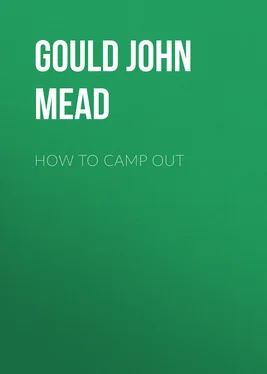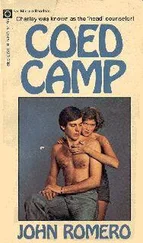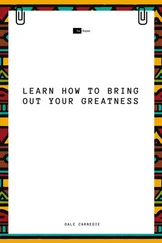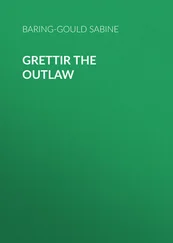John Gould - How to Camp Out
Здесь есть возможность читать онлайн «John Gould - How to Camp Out» — ознакомительный отрывок электронной книги совершенно бесплатно, а после прочтения отрывка купить полную версию. В некоторых случаях можно слушать аудио, скачать через торрент в формате fb2 и присутствует краткое содержание. Жанр: Хобби и ремесла, foreign_home, Биология, на английском языке. Описание произведения, (предисловие) а так же отзывы посетителей доступны на портале библиотеки ЛибКат.
- Название:How to Camp Out
- Автор:
- Жанр:
- Год:неизвестен
- ISBN:нет данных
- Рейтинг книги:4 / 5. Голосов: 1
-
Избранное:Добавить в избранное
- Отзывы:
-
Ваша оценка:
- 80
- 1
- 2
- 3
- 4
- 5
How to Camp Out: краткое содержание, описание и аннотация
Предлагаем к чтению аннотацию, описание, краткое содержание или предисловие (зависит от того, что написал сам автор книги «How to Camp Out»). Если вы не нашли необходимую информацию о книге — напишите в комментариях, мы постараемся отыскать её.
How to Camp Out — читать онлайн ознакомительный отрывок
Ниже представлен текст книги, разбитый по страницам. Система сохранения места последней прочитанной страницы, позволяет с удобством читать онлайн бесплатно книгу «How to Camp Out», без необходимости каждый раз заново искать на чём Вы остановились. Поставьте закладку, и сможете в любой момент перейти на страницу, на которой закончили чтение.
Интервал:
Закладка:
ADVANTAGES AND DISADVANTAGES OF THIS MODE OF TRAVEL
This way of travelling is peculiarly adapted to a party of different ages, rather than for one exclusively of young men. It is especially suitable where there are ladies who wish to walk and camp, or for an entire family, or for a school with its teachers. The necessity of a head to a party will hardly be recognized by young men; and, even if it is, they are still unwilling, as a general rule, to submit to unaccustomed restraint.
The way out of this difficulty is for one man to invite his comrades to join his party, and to make all the others understand, from first to last, that they are indebted to him for the privilege of going. It is then somewhat natural for the invited guests to look to their leader, and to be content with his decisions.
The best of men get into foolish dissensions when off on a jaunt, unless there is one, whose voice has authority in it, to direct the movements.
I knew a party of twenty or more that travelled in this way, and were directed by a trio composed of two gentlemen and one lady. This arrangement proved satisfactory to all concerned. 5 5 I never heard of a party exclusively of young men going on a tour of this kind, and consequently I cannot write their experiences; but I can easily imagine their troubles, quarrels, and separation into cliques. I once went as captain of a party of ten, composed of ladies, gentlemen, and schoolboys. We walked around the White Mountains from North Conway to Jefferson and back, by way of Jackson. It cost each of us a dollar and thirty-two cents a day for sixteen days, including railroad fares to and from Portland, but excluding the cost of clothes, tents, and cooking-utensils. Another time a similar party of twelve walked from Centre Harbor, N.H., to Bethel, Me., in seventeen days, at a daily cost of a dollar and two cents, reckoning as before. In both cases, "my right there was none to dispute;" and by borrowing a horse the first time, and selling at a loss of only five dollars the second, our expenses for the horse were small.
It has been assumed in all cases that some one will lead the horse,—not ride in the loaded wagon,—and that two others will go behind and not far off, to help the horse over the very difficult places, as well as to have an eye on the load, that none of it is lost off, or scrapes against the wheels. Whoever leads must be careful not to fall under the horse or wagon, nor to fall under the horse's feet, should he stumble. These are daily and hourly risks: hence no small boy should take this duty. 6 6 In one of my tours around the mountains, a lad of sixteen, in attempting to hold up the horse's head as they were running down hill, was hit by the horse's fore-leg, knocked down, and run over by both wheels.
CHAPTER IV
CLOTHING
If your means allow it, have a suit especially for the summer tour, and sufficiently in fashion to indicate that you are a traveller or camper.
SHIRTS
Loose woollen shirts, of dark colors and with flowing collars, will probably always be the proper thing. Avoid gaudiness and too much trimming. Large pockets, one over each breast, are "handy;" but they spoil the fit of the shirt, and are always wet from perspiration. I advise you to have the collar-binding of silesia, and fitted the same as on a cotton shirt, only looser; then have a number of woollen collars (of different styles if you choose), to button on in the same manner as a linen collar. You can thus keep your neck cool or warm, and can wash the collars, which soil so easily, without washing the whole shirt. The shirt should reach nearly to the knees, to prevent disorders in the stomach and bowels. There are many who will prefer cotton-and-wool goods to all-wool for shirts. The former do not shrink as much, nor are they as expensive, as the latter.
DRAWERS
If you wear drawers, better turn them inside out, so that the seams may not chafe you. They must be loose.
SHOES
You need to exercise more care in the selection of shoes than of any other article of your outfit. Tight boots put an end to all pleasure, if worn on the march; heavy boots or shoes, with enormously thick soles, will weary you; thin boots will not protect the feet sufficiently, and are liable to burst or wear out; Congress boots are apt to bind the cords of the leg, and thus make one lame; short-toed boots or shoes hurt the toes; loose ones do the same by allowing the foot to slide into the toe of the boot or shoe; low-cut shoes continually fill with dust, sand, or mud.
For summer travel, I think you can find nothing better than brogans reaching above the ankles, and fastening by laces or buttons as you prefer, but not so tight as to bind the cords of the foot. See that they bind nowhere except upon the instep. The soles should be wide, and the heels wide and low (about two and three-quarter inches wide by one inch high); have soles and heels well filled with iron nails. Be particular not to have steel nails, which slip so badly on the rocks.
Common brogans, such as are sold in every country-store, are the next best things to walk in; but it is hard to find a pair that will fit a difficult foot, and they readily let in dust and earth.
Whatever you wear, break them in well, and oil the tops thoroughly with neat's-foot oil before you start; and see that there are no nails, either in sight or partly covered, to cut your feet.
False soles are a good thing to have if your shoes will admit them: they help in keeping the feet dry, and in drying the shoes when they are wet.
Woollen or merino stockings are usually preferable to cotton, though for some feet cotton ones are by far the best. Any darning should be done smoothly, since a bunch in the stocking is apt to bruise the skin.
PANTALOONS
Be sure to have the trousers loose, and made of rather heavier cloth than is usually worn at home in summer. They should be cut high in the waist to cover the stomach well, and thus prevent sickness.
The question of wearing "hip-pants," or using suspenders, is worth some attention. The yachting-shirt by custom is worn with hip-pantaloons, and often with a belt around the waist; and this tightening appears to do no mischief to the majority of people. Some, however, find it very uncomfortable, and others are speedily attacked by pains and indigestion in consequence of having a tight waist. If you are in the habit of wearing suspenders, do not change now. If you do not like to wear them over the shirt, you can wear them over a light under-shirt, and have the suspender straps come through small holes in the dress-shirt. In that case cut the holes low enough so that the dress-shirt will fold over the top of the trousers, and give the appearance of hip-pantaloons. If you undertake to wear the suspenders next to the skin, they will gall you. A fortnight's tramping and camping will about ruin a pair of trousers: therefore it is not well to have them made of any thing very expensive.
Camping offers a fine opportunity to wear out old clothes, and to throw them away when you have done with them. You can send home by mail or express your soiled underclothes that are too good to lose or to be washed by your unskilled hands.
CHAPTER V
STOVES AND COOKING-UTENSILS
If you have a permanent camp, or if moving you have wagon-room enough, you will find a stove to be most valuable property. If your party is large it is almost a necessity.
For a permanent camp you can generally get something second-hand at a stove-dealer's or the junk-shop. For the march you will need a stove of sheet iron. About the simplest, smallest, and cheapest thing is a round-cornered box made of sheet iron, eighteen to twenty-four inches long and nine to twelve inches high. It needs no bottom: the ground will answer for that. The top, which is fixed, is a flat piece of sheet iron, with a hole near one end large enough for a pot or pan, and a hole (collar) for the funnel near the other end. It is well also to have a small hole, with a slide to open and close it with, in the end of the box near the bottom, so as to put in wood, and regulate the draught; but you can dispense with the slide by raising the stove from the ground when you want to admit fuel or air.
Читать дальшеИнтервал:
Закладка:
Похожие книги на «How to Camp Out»
Представляем Вашему вниманию похожие книги на «How to Camp Out» списком для выбора. Мы отобрали схожую по названию и смыслу литературу в надежде предоставить читателям больше вариантов отыскать новые, интересные, ещё непрочитанные произведения.
Обсуждение, отзывы о книге «How to Camp Out» и просто собственные мнения читателей. Оставьте ваши комментарии, напишите, что Вы думаете о произведении, его смысле или главных героях. Укажите что конкретно понравилось, а что нет, и почему Вы так считаете.











